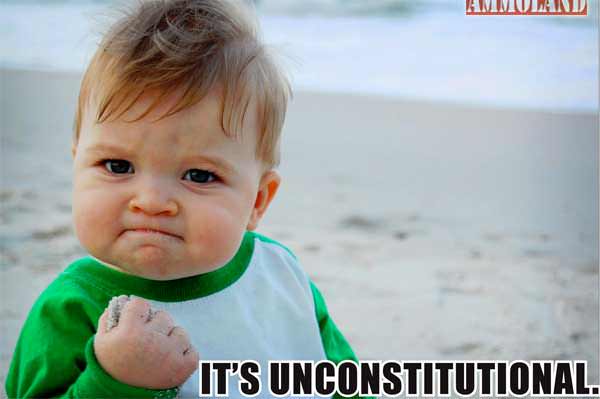
“Believe nothing, no matter where you read it or who has said it, not even if I have said it, unless it agrees with your own reason and your own common sense.” ~ Buddha
“Just as it is the duty of all men to obey just laws, so it is the duty of all men to disobey unjust laws.” ~ Martin Luther King Jr.

PHOENIX, AZ –-(Ammoland.com)- My brief statement in Page Nine No. 143 about how to identify unconstitutional law was so popular I figure I should provide the entire research blurb I’ve compiled.
Go ahead and circulate it so more people are more aware, the country needs this:
“The general rule is that an unconstitutional statute, though having the form and name of law, is in reality no law, but is wholly void, and ineffective for any purpose; since unconstitutionality dates from the time of its enactment, and not merely from the date of the decision so branding it. No one is bound to obey an unconstitutional law, and no courts are bound to enforce it.”
— 16 Am Jur 2d, Sec 177 late 2d, Sec 256
From Supreme Court Gun Cases (Kopel, Halbrook, Korwin, Bloomfield Press, 2003):
“Miranda’s basic principles are only tangential to the infringement issues continually arising over the right to keep arms and the right to bear arms, and Miranda is by no stretch a gun case itself per se. But it is in a special category of cases that is cited frequently in terms of the general rights involved in firearms rights. A reader who feels that the inclusion of this case goes too far afield of the Supreme Court Gun Cases theme (and case count) will be pleased to note that the following seven cases have not been included for that very reason:
Marbury v. Madison, 5 U.S. 137 1803:
“an act of the legislature repugnant to the constitution is void.”
Boyd v. United States, 116 U.S. 616 1886:
“It is the duty of courts to be watchful for the constitutional rights of the citizen, and against any stealthy encroachments thereon.”
Norton v. Shelby County, 118 U.S. 425 1886:
“An unconstitutional act is not law; it confers no rights; it imposes no duties; affords no protection; it creates no office; it is in legal contemplation as though it had never been passed.”
Olmstead v. United States, 277 U.S. 438 1928:
“Experience should teach us to be most on our guard to protect liberty when the government’s purposes are beneficent. Men born to freedom are naturally alert to repel invasion of their liberty by evil-minded rulers. The greatest dangers to liberty lurk in insidious encroachment by men of zeal, well meaning but without understanding.” (Note: quoted from dissent.)
Murdock v. Pennsylvania, 319 U.S. 105 1943:
“A state may not impose a charge for the enjoyment of a right granted by the Federal Constitution.”
“a person cannot be compelled ‘to purchase, through a license fee or a license tax, the privilege freely granted by the Constitution.’” (read Gun Permits, FOIDs)
Staub v. Baxley, 355 U.S. 313 1958:
“It is settled by a long line of recent decisions of this Court that an ordinance which, like this one, makes the peaceful enjoyment of freedoms which the Constitution guarantees contingent upon the uncontrolled will of an official-as by requiring a permit or license which may be granted or withheld in the discretion of such official-is an unconstitutional censorship or prior restraint upon the enjoyment of those freedoms.” (read Concealed Carry Permits)
Shuttlesworth v. City of Birmingham Alabama, 394 U.S. 147 1969:
“And our decisions have made clear that a person faced with such an unconstitutional licensing law may ignore it and engage with impunity in the exercise of the right of free expression for which the law purports to require a license.”
“It’s probably a good idea to keep in mind that the axiom described in these cases-an unconstitutional law is void-has an important corollary. Even an unconstitutional law is the law, and stays in place with full force and effect, until it is declared unconstitutional by a court of competent jurisdiction, or until removed by the legislature. People are arrested, prosecuted and imprisoned under unconstitutional laws all the time. Some get off later.”
“That can be summed up with a piece of street wisdom: The law means what the officer with the gun in your ear says it means.”
About GunLaws.com:
Scottsdale, Ariz.-based Bloomfield Press, founded in 1988, is the largest publisher and distributor of gun-law books in the country. Our website, gunlaws.com, features a free national directory to gun laws and relevant contacts in all states and federally, along with our unique line of related books and DVDs. “After Your Shoot” for media review is available on request, call 800-707-4020. Our authors are available for interview, call to schedule. Call for cogent positions on gun issues, informed analysis on proposed laws, talk radio that lights up the switchboard, fact sheets and position papers. As we always say, “It doesn’t make sense to own a gun and not know the rules.” Visit: www.gunlaws.com
